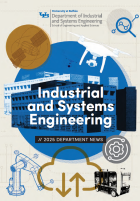PhD student’s award-winning online retail model a ‘win-win’ for buyer and sellers

Svetlana Riabova won the Best Fireside Chat Award and received an Honorable Mention Poster Award.at the 2023 Grid Science Winter School and Conference. Photo: Svetlana Riabova
By Tom Dinki
Published April 24, 2023
Online shopping can help businesses reach more customers, but delivering all those packages to front doors on time requires fuel, vehicle maintenance and complex logistics, not to mention an increased carbon footprint.
The solution, according to School of Engineering and Applied Sciences student Svetlana Riabova, is offering discounts to customers who order online but pick up in person. In the third year of her industrial and systems engineering PhD, her dissertation proposes a bilevel optimization model that incentivizes in-store pickup over home delivery.
“The retailer gets cheaper routing and the customer gets lower prices and improved delivery times,” Riabova says. “In this kind of relationship, no player can force another one to do something, so we need to make sure that the proposed solution is actually a win-win.”
Riabova’s research was recognized by the Los Alamos National Laboratory's 2023 Grid Science Winter School and Conference, which took place in January in Santa Fe, N.M. She won the conference’s Best Fireside Chat Award and received an Honorable Mention Poster Award.
“I am glad to see this work recognized by other researchers in the field,” says Jose Walteros, Riabova’s adviser and assistant professor in the Department of Industrial and Systems Engineering within the University at Buffalo School of Engineering and Applied Sciences. “I hope it gives Svetlana the motivation to do even more impressive research work in the future.”
Ecommerce has surged since the start of the COVID-19 pandemic, with United States sales increasing 43% in 2020 and surpassing $1 trillion in 2022 for the first time ever, according to Census Bureau data.
Riabova says although online retail is considered cheaper than selling exclusively out of brick-and-mortar stores, costs can add up quickly between fuel, vehicles, labor and scheduling. Last year Amazon cited rising fuel costs when adding a 5% surcharge for third-party sellers who use its fulfillment services.
And it’s estimated more than half of shipping costs – approximately 53% – occur during the last mile of delivery to the customer.
Riabova says retailers can eliminate those so-called last-mile costs by having customers pick up online orders at their stores, distribution centers or other locations, a model sometimes referred to as buy online, pick up in store (BOPIS).
More than half of retailers now offer BOPIS and nearly one in five online orders placed this past holiday season globally were done using BOPIS.
However, Riabova notes that some customers still prefer the convenience of home delivery.
“There is a need to motivate them,” she says.
Riabova proposes a discount system where customers receive a percentage off their online order in exchange for picking it up themselves.
Walmart announced a similar BOPIS discount model in 2017, saying it was possible due to the savings from delivering items to its stores rather than to customers' homes. The discounts vary depending on how much Walmart saves on shipping costs, so larger items like 70-inch TVs that must ship via freight are discounted more.
“A retailer’s savings on delivery should be enough to at least cover the expenses on discounts,” Riabova says.
This model could benefit the environment, too, Riabova adds. One study found that online retail results in more greenhouse gas emissions per item than in-store retail, as customers often make frequent purchases of only a few items when shopping online but buy in bulk when visiting a store.
“I would expect this to particularly benefit big cities where people tend to use public transportation more. That way BOPIS carries no additional emissions and road network load,” Riabova says.
As for the profitability of her model, Riabova says that depends largely on how customers respond to the policy: They still have a choice and will ultimately choose what’s best for them.
Specializing in operations research, Riabova, a native of Saint Petersburg, Russia, says she’s fascinated by interactions between decision makers and promoting certain behaviors.
“This is particularly important today when we have to be very mindful of the resources we have and a lot of power lies in the hands of private agents,” she says.
Walteros says Riabova possesses fundamental characteristics not commonly found in graduate students, “the initiative required to push the boundaries of her research, and the motivation to go beyond the suggestions and advice that she receives.”
The Grid Science Winter School and Conference features five days of lectures, seminars and presentations centered on developing innovative approaches for the electrical grid, natural gas networks and other complex engineered networks.
Riabova was among more than 30 graduate students and postdocs selected to attend and present a poster following a competitive application process.
Attending conferences is her favorite part of being a graduate student, she says.
“I take inspiration from people presenting their neat mathematical and engineering solutions to make our lives better,” she says.
